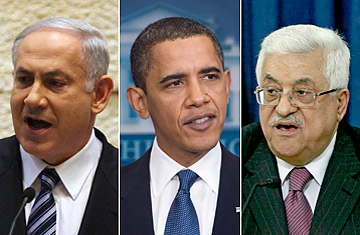
From left: Israeli Prime Minister Benjamin Netanyahu, U.S. President Barack Obama and Palestinian Authority President Mahmoud Abbas
President Barack Obama made no mention in his State of the Union address Wednesday night of the Middle East peace process, which had been one of the first foreign policy priorities of his Administration. That's probably because he had nothing good to report: after a year of efforts by special envoy George Mitchell, the prospects of an Israeli-Palestinian deal are, if anything, worse now than when he started. In fact, with Mitchell's failure on a trip to the region last weekend to get even low-level talks going, the Administration faces the hard reality that its interventions in the region's most intractable conflict have been largely ineffectual.
The alternatives to Mitchell's grinding effort to start negotiations are not particularly appetizing, but he has recently been getting counsel from outsiders on what he might try to do differently. The most influential source of behind-the-scenes advice is a high-powered but secretive bipartisan group at the U.S. Institute of Peace, chaired by two former National Security Advisers, Stephen Hadley and Sandy Berger. USIP is a government-backed think tank that has run high-profile commissions such as the Baker-Hamilton Iraq Study Group and the Perry-Schlesinger panel on the U.S. nuclear posture. Mitchell himself previously headed a USIP panel on U.N. reform with Newt Gingrich.
Berger, who served Bill Clinton, and Hadley, who served George W. Bush, meet once a month for four to five hours with some 25 experts, many of them veterans of a peace process that has dragged on for two decades. Hadley and Berger task individual members with tackling issues relevant to the peace process, such as the fate of Jerusalem and the problem of Israel's settlements. The group has produced more than six papers for consideration by Mitchell and policymakers in the White House and the State Department.
Hadley and Berger generated their own memo for Mitchell in advance of a one-hour meeting they held with him recently in New York. Other members of the group, including former U.S. ambassadors to Israel Dan Kurtzer and Martin Indyk, meet often with Mitchell. Indyk also serves as an outside adviser to Mitchell.
Members of the USIP group refused to describe the content of their meetings with Mitchell, but Administration sources confirmed that the discussions had taken place and provided some details of Mitchell's interactions with the group. USIP's head, Richard Solomon, tried to get Mitchell to participate directly in the group's activities at its inception, but Mitchell "kept his distance," says one person familiar with the work of the group.
None of the members of the group interviewed for this article agreed to speak on the record, but all were largely negative about the current situation. "The status quo is not sustainable," says a senior member of the group. "International tolerance of Israeli policies is eroding and Palestinian democrats are coming under increasing pressure. The prospects for a two-state solution are eroding as well as Palestinians lose confidence that peace is possible." Several members of the group argue that the Administration's early decision to insist on a complete freeze of Israeli settlements contributed to the problem.
If the group is largely in agreement on the current prognosis for peace talks — not good — it has yet to settle on a way forward. One senior member of the group, expressing his own opinion, says that in the wake of Mitchell's failure last weekend, the Administration has two options: taking a "minimalist approach," in which the U.S. goes through the motions of pushing for peace for appearances' sake, without actually driving a process that could achieve it; or putting specific ideas on the table about the contours of a final peace agreement.
A senior Administration official says the group is just one of many providing Mitchell with advice, but declines to name any others with whom he has met recently. The senior Administration official says Mitchell intends to continue working to bring the parties to the table. But several members of the group say that given the political positions of Israeli leader Benjamin Netanyahu and Palestinian leader Mahmoud Abbas, there may be nothing Mitchell can do to convince the two sides to engage in a meaningful process.
